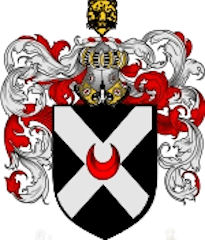18th Century Lytles in Scotland and Ireland
Edward Lytle, born in 1902, inherited some family papers, including some letters from Lytles living in Ireland. He shared them with my Mother, Ruth Lytle.
One is from a Mrs Millar living in County Derry in Ireland, who began researching her Lytle ancestors in the 1870’s. She wanted to trace two of them who were both Presbyterian Ministers. She had found out that eight Lytle brothers had lived in Scotland, and had all left after the 18thC Religious Persecutions, and settled in Ireland, both Northern and Southern. Many had married into other Scottish ex-pat families.
Mrs Millar wrote to John Kinnear the Presbyterian Minister of Letterkenny in the North of Ireland in August 1879 enquiring about the previous Ministers in his parish, whom she knew included some Lyltes.
She was the daughter or wife of Rev T. Millar of Cookstown in Ireland. His reply states that:
“Joseph Lytle was ordained on April 20th 1763, and died on January 7th 1805. An M.S. of one of his sermons still exists.
Joseph Lytle, his nephew was ordained on May 31st 1803, he resigned in 1839, and he died on 19th December 1852.”
[NOTE: Subsequent research in May 2018 has uncovered the Ecclesiastical Directory that lists Thomas Millar, James and John Kinnear, Joseph and William Lytle as ordained ministers of the Presbyterian Church in Ireland. View Document ]
She states in a letter from 1879:
“The earliest information I could get regarding our family was that eight brothers came over to Ireland and only two sat down in Co. Derry. One brother at Maghere, and our predecessor at Garvagh. My great granduncle was a Presbyterian Minister of Letterkenny and married to an aunt of the late Lord Plunket, who was one of the Lord Chancellors of Ireland.
My father was educated for the Ministry but his health failed and he took to farming. My grandmother was one of the Duncans – nearly related to the late Lady MacNaughton at Bushmills – as well as the Douglasses of Dervock.
Your grandmother was Moore from Tobermore of English descent. Her uncle was a Presbyterian Minister in the Co. Cavan, and educated his son for the Bar and he became Judge Moore.
The Lytles of Stewartstown are in the same connection, as are the Lytles of Monaghan and Downpatrick. I never could hear of any family in Antrim; John’s father at Portglenone was from Garvagh.
Whatever was the cause of the original settlement and what position did the eight brothers occupy in Scotland when expatriated? I should suppose farmers, as all of them took to that occupation so far as I could learn in Ireland. There is no doubt that they must have had means and were respectable.”
Mrs Millar does not mention that six Lytle brothers in the 1830’s once again emigrated because of religious persecution: five going to America, and one, John Lytle Sr. going to England. Edward Lytle thinks they were living in Northern Ireland, not the South. This is the point we pick up the story of the England-based Lytles.
18th Century Lytles in England
In 1979, Edward Lytle was intrigued by a request from ‘Family Researchers Ltd’ (who were trying to trace Lytle relations, and pass on a Trust Fund.) to supply details of his ancestors. But he could not do so because his Father had been one of three young orphans left in the 1870’s with no knowledge of their family history. Edward then began researching the early Lytles, and added some notes of his own, from memories he had from his Father, Edward Arthur, and from his Uncle, John Taylor Lytle. All he was sure of, was that his grandfather, John Lytle Snr, had to leave Ireland with his five brothers, as they were on a ‘death list’ during the religious troubles, between 1826 and 1829, being Protestants, leaving all their property behind. The other five brothers emigrated to North America.
There is a Lytle in the ‘U.K. Immigrant to Canada Listing’. In 1829 Graham Lytle and his wife and four children sailed to Canada. This surely must be one of the Lytle brothers.
